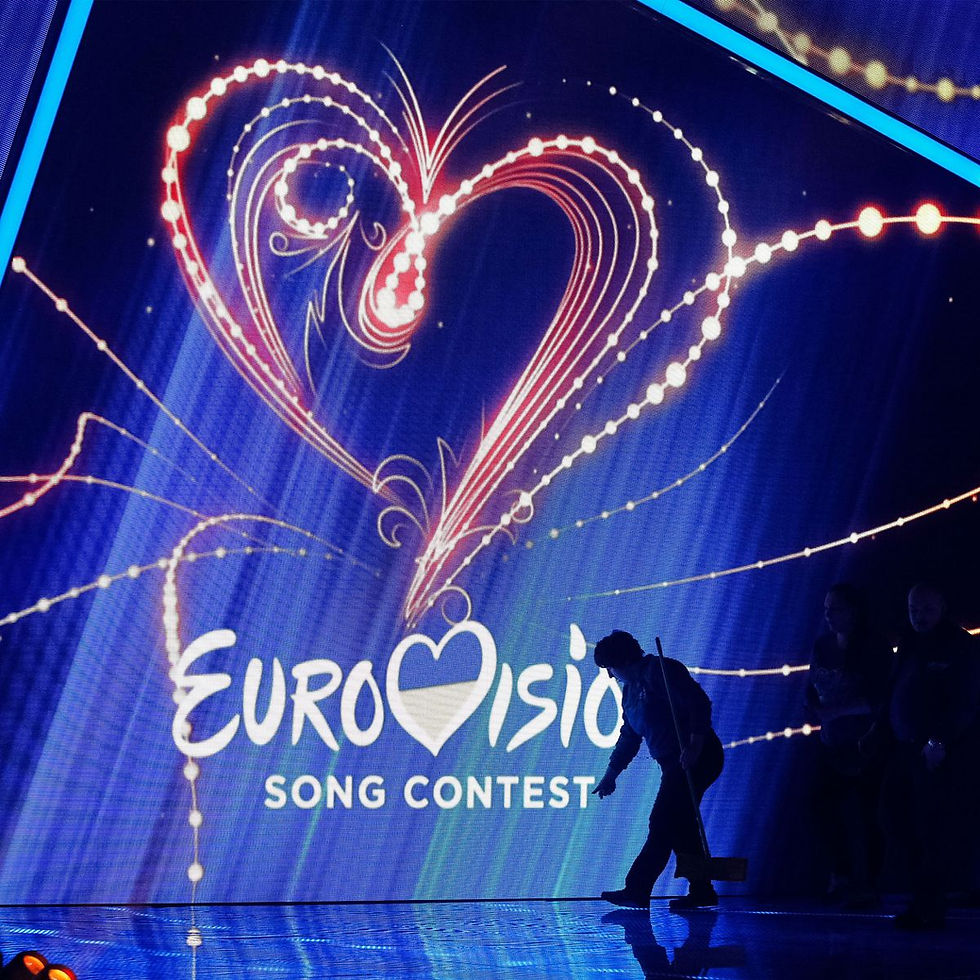Poptimism: Couldn’t Escape if I Wanted To
- Harry Myers

- Mar 25, 2021
- 6 min read
The age-old debate of Rockism vs. Poptimism isn’t misplaced in the discussion of cultural reflexivity, and the Eurovision Song Contest certainly has its place on the impact of this phenomenon.
Eurovision is undeniably a global cultural practice. For one glorious night every year, politics is put aside (it definitely, 100%, absolutely is not), and the world watches as the whole of Europe comes together in a ‘camp-tastic’ romp celebrating the hottest up-and-coming musical talent across the continent, while simultaneously (and this is actually true) putting the United Kingdom into an annual glitter shortage. The renaissance of Eurovision saw the evolution of pop culture. The way we consumed it and how it was distributed changed, and ultimately the nature of the music industry changed with it - but to many, it wasn’t necessarily welcome.
Ever find yourself salivating over your old perfectly preserved Lynyrd Skynyrd gig tickets? Do you find yourself stroking the well-worn spines of your strictly pre-1980s record collection, shamelessly taking up a whole room of your memorabilia-laden home? Then you, like many others, may well be what music journalism has so proudly coined, a ‘Rockist’. Or do you find yourself sinking further into the Spotify algorithm on a daily basis, soaking up Drake’s artist radio or The Best of Worldwide Hot Hits 2020? All of this, of course, while you update your Tinder bio explaining why you have an unmatched love for music that no one else has heard before and you take another sip out of your freshly prepared skinny frappe? Then you, most likely, find yourself identifying as the disgraced younger sister of Rockism and its grungy band of Guitar-Drums-Vocals-ONLY Rockists. You might call yourself… A ‘Poptimist’.
It’s almost impossible not to mention one specific band when discussing Poptimism in conjunction with the exponential rise of Eurovision; that band being, of course, ABBA. You probably associate ABBA with a few too many champagnes at the all too familiar New Year’s family get-together. The hopeful blind optimism of the Nordic band’s music, in many ways, helps you forget that it might be the most humiliating evening of your young adult-hood as you’re cornered by another distant relative who insists on discussing politics, or the economy, or any other depressing current affair. It’s innate to understand why ABBA was one of the founding fathers of 80s pop, their worldwide outreach is only comparable to that of the Bible, and you can do nothing but simply submit to the band being in your life in one way or another. Love them, or hate them, they’re there - and they’ve already proven that they’re in it for the long run. So much so that having an actual opinion on the group exhibits little, and it’s a part of the unusual grey area of ‘taste’ that doesn’t actually help form any identifiable cultural image.
Famous Eurovision artists started to seep into global pop culture like bacteria in a swamp in the latter stages of the twentieth century, so it was inevitable that it would become more difficult to critique art for what it was objectively as opposed to feeling the need to congratulate the artist who had their name on it. The issue is that the industry has been developed in their image, and not the other way around. With the rise of popularity competitions, music became more globally commercialised and with it honest critique became a little bit less honest. Artists now need a gimmick, but not too much of a gimmick, artists now need sex appeal, but that sickly kind of sex appeal, artists now need a social media presence, but not an over bearing one. It’s this very blueprint for global pop music that has pandered to a frothy, unchallenging discography that so shamelessly infects the charts today. The industry standard now seems to be the ability to creatively sit on the fence, while also being able to churn out empty number one smash hits.
It’s journalists who seem to suffer most for this phenomenon. Writers now need to be prepared to sing the praises of artists for achieving no more than these objectives, or potentially face public shaming by no other than the artist themselves. It’s almost fighting a losing battle criticising it, as writers now seem to be convincing themselves that, “you literally can’t extend the feeling of ‘hate’ towards something so… neutral and unambitious.” This feat tends to be achieved as they place the fifth star on their latest SPIN review hailing Justin Beiber’s Yummy as “groundbreaking” with a metaphorical gun to their head.
This isn’t to say at all that Eurovision artists don’t offer us anything; ABBA were undeniably a talented group musically, Julio Eglesias practically invented sex appeal and Olivia Newton-John is the face of one of the biggest films of the 70s. The fact remains that in the twentieth century, so many artists who did go on Eurovision were in fact ambitious. To say that ABBA ‘took the world by storm’ would be somewhat of an understatement; their 1974 competition-winning anthem Waterloo really did change things for the music industry, and ultimately music criticism.
This benchmark, that was so infamously set by the glossy Swedes on that fateful night in Brighton, became practically impossible to criticise, as how could any song that tops the charts in the UK, Ireland, Belgium, West Germany, Denmark, Finland, Norway, South Africa and Switzerland ever be considered bad? Not to mention the other ludicrously long list that shows where they humbly made the top 10. Waterloo sold roughly six million copies worldwide, which made it one of the best selling singles of all time. Eurovision had finally carved its place in the pop culture annals of history, taking no prisoners and fabulously announcing themselves to the rest of the world.
So it comes as no surprise that this cultural movement, along with helping hands from the rapidly developing technology in the media at the time, created a divide, and even resentment, within music lovers and music criticism. ‘Pure’ music and songwriting was slowly waving goodbye and leaving for the promised land along with their blown out, overworked VOX AC130 speakers. Left behind was a new movement, of diversity and the ability to say “no, we don’t need a sweaty old man playing his 6-string on this tune, thanks.” This naturally rattled a few cages, as writers who had made their living by taking far too much pleasure out of throwing 1 star reviews at anyone who didn’t embody ‘Rock n’ Roll’ were being pushed aside, and in their place was a writing movement that embraced the cheesiness, the weird and the wonderful.
In a brilliant discussion on the Eurovision podcast, music journalist Ned Raggett, in his commanding Buzz Lightyear-esque tones, mentions the nature of what Rockism means in the modern music industry. He considers that the central focus on Rock throughout the latter stages of the 20th Century to have been the creator of an unavoidable bias within music criticism. The term ‘Rockism’ is a phrase coined to humorously reflect another hugely significant issue throughout this period: Racism. Music critics became so focused on the notion that their word is final in the whole “I have a better music taste than you” debate that they, effectively, became discriminatory towards the rapidly expanding spectrum of musical craft, which ultimately made them what we now call a rockist.
Not only this, but it’s the very thing that so many rockists hate that helped expand and globalise so many aspects of modern journalism. Eurovision makes no attempt at pretending to be everyone’s favourite night of the year. But it was the tone of journalism Eurovision inspired that made it what it is today. Poptimism raised the profile of Eurovision in the US and the rest of the world at an immeasurable rate, and once the initial concept of the pageant-like music competition had been embraced, there was almost no stopping it. Not to mention the fact that it now appeals to even more audiences by displaying the genres of music that people who most likely hate the competition listen to. You can’t have a Eurovision now where you don’t hear a brain-melting Slavic metal tune that gives you a migraine for at least the next four days.
The argument stands therefore that Rockism hasn’t necessarily been quashed by man-buns, vegetarianism and positive vibes, but it has simply become a thing of the past. Poptimism has invited a new-found global acceptance of cultural evolution into journalistic writing; where writers and readers no longer need to shy-away from popular culture, but to celebrate why and how these things have become so significant in today’s society. It’s a difficult concept to get your head around, especially because of social media’s echo chambers and dark cellars which are incredibly hard to escape from once you’re in them. But the question remains, in the twenty-first century, where so much negativity is a few thumb taps away from ruining your day, is it a bad thing that poptimism has become such a commonplace form of journalistic writing? Especially when considering the fundamentals: it’s a practice that celebrates and embraces a diverse audience. These fundamentals, meanwhile, are all a part of the ethos that made the Eurovision Song Contest what it is today.







Comments